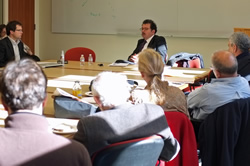
Chibli Mallat, lawyer, professor, democracy activist, and a former candidate for presidency in Lebanon in 2006, gave a presentation on the “constitutional moment” in the Middle East as the Visiting Professor of Law and the Oscar M. Ruebhausen Distinguished Senior Fellow at the Yale Law School. It was sponsored by the Council on Middle East Studies.
While an audience listened to Professor Mallat’s talk, people in Cairo were out on the street and demonstrating in favor, as well as against, the draft Egyptian constitution, whose 236 articles had just been passed by the Constitutional Assembly a week before. In his talk, Professor Mallat advised against any rush in constitution writing, stressing that societies should take time and expand the constitutional moment as far as possible. “Lawyers, rather than politicians, should be employed to work on the language of the constitution, and shorter constitutions,” said Professor Mallat, “are always better than those that try to solve or gloss over problems with more words.”
Profesor Mallat recommended that the new constitutions of the Middle East should engage seriously with the rich tradition in Islamic law and include, for instance, Qur’anic statements such as “there is no compulsion in religion” within their texts.
